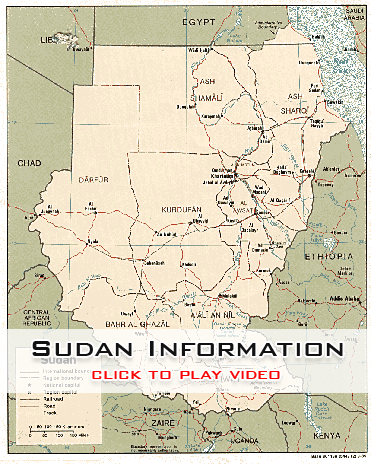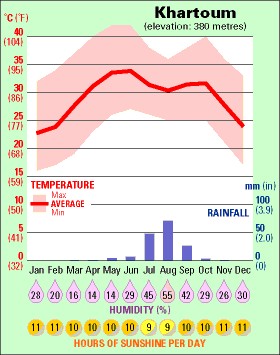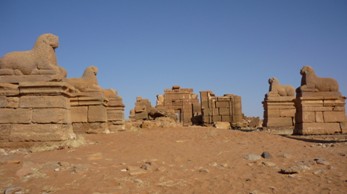
Location
Northeast Africa.
Area
2,505,813 sq km (967,500 sq miles).
Population
32.9 million (UN estimate 2002).
Population Density
13.1 per sq km.
Capital
Khartoum.
Population: 2.4 million (UN estimate 2002; including suburbs).
Government
Republic since 1986. Gained independence from the UK in 1956.
Language
Arabic is the official language. English and many local dialects are widely
spoken.
Religion
Muslim and Christian in the south.
Time
GMT + 3.
Electricity
240 volts AC, 50Hz.
Telephone
IDD is available. Country code: + 249.
Mobile Telephone
Roaming agreements exist with some international mobile phone companies.
Coverage is available in main towns.
Internet
Internet access is available in main towns.
Post
Post office hours: Sat-Thurs 0830-1200 and 1730-1830. Airmail to Europe
takes up to one week.
Press
Several Arabic and English newspaper and magazine are available
Radio
SNBC runs national and regional networks. Several FM station are available
too.
Note
Sudan
festivals are timed according to local sightings of various phases of the moon
and the dates given above are approximations. During the lunar month of Ramadan
that precedes Eid al-Fitr, Muslims fast during the day and feast at night and
normal business patterns may be interrupted. Many restaurants are closed during
the day and there may be restrictions on smoking and drinking. Some disruption
may continue into Eid al-Fitr itself. Eid al-Fitr and Eid al-Adha may last
anything from two to 10 days, depending on the region.
Contact Information:
Ministry of Tourism and National Heritage
PO Box 13226, Khartoum, Sudan
Tel: (183) 472 604 or 471 329.
The original inhabitants of this area were converted to Christianity – the
Egyptian-based Coptic version - in the sixth century AD, and then to Islam in
the 15th century, when Arabic forces from the Gulf moved into the region. The
Egyptians reclaimed control of the provinces of Nubia, Senaar and Kordofan,
which make up modern Sudan, in a campaign between 1820 and 1822. In the mid-19th
century, Sudan became of interest to the UK, because of its strategic importance
for trade routes to India via the newly-opened Suez Canal, as well as the desire
to limit French influence in the West. The French had already encroached as far
as Chad – Sudan’s immediate neighbor – and would ultimately control the bulk of
northwest Africa.
Consequently, Sudan came under British and Egyptian control in the 1880s. Local
resistance at this time was led by Mahdi Mohammed Ahmed, a figure revered by his
people as both a mystic and a holy warrior. The so-called Mahdists defeated a
British-led force of Egyptian troops in 1883. This culminated in the death of
the British commander, General Gordon, when the Sudanese took Khartoum after a
long siege. The Mahdists retained control of Sudan until the British
re-conquered the territory in 1898. An Anglo-Egyptian condominium was
established in 1899. In 1914, Egypt itself was made a British protectorate and
Sudan was accordingly taken under British rule. When the protectorate was
dissolved in 1922, the future of Sudan was left open, as a subject of further
negotiations. In 1929, the condominium was restored.
A further Anglo-Egyptian treaty in 1936 allowed Egyptian troops and civilian
immigrants to enter Sudan without restriction. After World War II, Sudan became
the subject of serious contention between Britain and Egypt. Efforts to co-opt
Sudan to Egyptian control in 1951 were firmly resisted by the Sudanese. Then, in
1952, the overthrow of Egypt’s King Farouk by Colonel Gamal Abdel Nasser (see
Egypt) brought to power an Egyptian government more sympathetic towards Sudan’s
independence aspirations. In 1952, Britain and Egypt agreed on a constitution
for Sudan, allowing free elections and a referendum on independence, which was
finally granted in 1956.
Economy
Once described as the bread basket of the Arab world, Sudan is a country of
high, though largely unrealized, economic potential, which is presently crippled
by civil war, a foreign debt of around US$15 billion, and climatic effects which
have brought both drought and flooding.
Agriculture employs most of the workforce, producing cotton – the major export,
wheat, groundnuts, sorghum and sugar cane. Production of gum Arabic, once an
important product, has declined through the introduction of synthetic
substitutes and increasing competition, particularly from West Africa. Livestock
breeding has suffered from persistent drought.
The manufacturing sector concentrates on processing the country’s agricultural
output (sugar, for example) and the production of textiles, cement and some
consumer goods. There are some mineral deposits including marble, mica,
chromate, gypsum and gold.
There are also some onshore oil deposits: located in the mid 1990s, these came
on stream in 1999 and have been of some help in easing Sudan’s chronic power
shortages. The government has announced a major dam project on the Nile and a
new oil refinery that are intended to meet both electricity demand and the
urgent need for planned water distribution.
Ultimately, Sudan relies on foreign aid to sustain its economy. Natural
phenomena, compounded by the effects of the two-decade-long civil war, have made
this more pressing than usual since 2000, as Sudan has needed two large
injections of emergency food aid to stave off mass famine.
Relations with the IMF have been rocky (Sudan was almost thrown out in the mid
1990s) but the Fund is now providing some financial support in exchange for a
standard economic reform program. Elsewhere, while the political posture of
Sudan’s Islamic government has alienated Western governments, it can still rely
on support from wealthy Arab states, notably Saudi Arabia.
Nonetheless, the government’s economic program has successfully achieved its
principal targets of 5 to 6% annual growth and inflation of below 5%.
Extremely hot (less so November to March). Sandstorms blow across the Sahara
from April to September. In the extreme north, there is little rain but the
central region has some rainfall from July to August. The southern region has
much higher rainfall, the wet season lasting May to October. Summers are very
hot throughout the country, whilst winters are cooler in the north.
Required Clothing
Tropical clothes all year, warmer clothes for cool mornings and evenings
(especially in the desert).

Social
Conventions
In the north, Arab culture predominates, while the people in the more fertile
south belong to many diverse tribes, each with their own lifestyle and beliefs.
Because Sudan is largely Muslim, although they are not expected to wear a veil
or cover their heads. At official and social functions as well as in some
restaurants, formal clothes are expected. The Sudanese have a great reputation
for hospitality. A curfew operates in major cities from 0000-0400.
Photography: There are many restrictions on photography: a photography
permit can be obtained from the External Information Office at the Ministry of
Information in Khartoum.
International Travel:
Getting There by Air
Nova Airways is the largest private carrier offering domestic and international
flights.
Departure Tax
US$20 (Sudanese nationals may pay in local currency). Transit passengers (within
24 hours) are exempt.
Main Airports
Khartoum (KRT) (Civil) is 4km (2 miles) southeast of the city. To/from
the airport: Taxi services are available. Facilities: Restaurants and
duty-free shops.
Getting There by Water
Main ports: Port Sudan and Suakin on the Red Sea.
There are car ferries from Aswan in Egypt to Wadi Halfa.
Getting
There by Rail
Rail links run from Cairo (Egypt) to Aswan High Dam and then by riverboat to
Wadi Halfa.
Overview
The following items may be imported into Sudan by visitors over 20 years of age
without incurring customs duty:
200 cigarettes or 50 cigars or 450g of tobacco; a reasonable amount of perfume
and eau de toilette for personal use; a reasonable amount of gifts.
The import of goods from Israel is prohibited. Sudan also adheres to the list
of prohibited goods drawn up by the Arab League and these include alcoholic
beverages. Fresh fruit and vegetables and blank pro-forma invoices may not be
imported. Firearms require a permit from the Ministry of Interior. Meat and fish
products are prohibited without prior permission from the Ministry of Animal &
Fish Resources.
Travel outside of Khartoum is restricted; see Passport/Visa section.
Getting Around By Air
Nova Airways runs services to 20 airports, including Dongola, Juba, El Obeid
and Port Sudan. The most reliable route is Port Sudan to Khartoum. There is also
an air-taxi service operating twice weekly to Nyala, available from Khartoum.
Getting Around by Water
River steamers serve all towns on the Nile but conditions are mostly unsuitable
for tourist travel. Services depend on fluctuating water levels. It is wise to
take food and water. Destinations include Dongola, Karima, Kosti and Juba. A
320km (200-mile) navigable canal, the Jonglei, is under construction in the
south.
Getting
Around by Rail
Sudan has
an extensive rail network (5500km/3418 miles) but the service is under
renovation, extremely slow and uncomfortable. Traveling first class is
advisable; second- and third-class compartments can get very crowded. Sleeping
cars are available on main route from Khartoum to Port Sudan. There are a few
air-conditioned carriages, for which a supplement is charged.
Getting Around by Road
Only major roads are asphalted; road conditions are poor outside towns,
roads to the north are often closed during the rainy season (July to September)
and street lights are non-existent. Owing to the bad conditions, a full set of
spare parts should be carried for long journeys. Vehicles must be in good
working condition. Traffic drives on the right. Bus: Services run between the
main towns and depart from the market places; however they are not entirely
safe. Souk (market) lorries are a cheap but uncomfortable method of transport.
Taxi: Also often unsafe, taxis can be found at ranks or hailed in the street.
Taxis are not metered; fares must be agreed in advance. Car hire: Available in
the main towns and at major hotels but charges are high. Documentation: Carnet
de Passage, adequate finance and roadworthiness certificate (from the Embassy)
are all needed. An International Driving Permit is recommended, although not
legally required. A temporary driving license is available from local police on
presentation of a valid British or Northern Ireland driving license, for a
maximum period of three months. Women are allowed to drive in Sudan.
Getting
Around Towns and Cities
Publicly operated bus services in Khartoum have of late become unreliable and
irregular, which has led to the proliferation of private bakassi minibuses,
nicknamed boks. They pick up and set down with no fixed stops. These operations
are on the fringes of legality and should be used with care.
The staple diet is fool, a type of bean, and dura, cooked maize or millet, which
are eaten with various vegetables. The hotel restaurants in Khartoum and Port
Sudan serve international cuisine and there are a few Greek and Middle Eastern
restaurants. If invited to a Sudanese home, more exotic food will usually be
served. Alcohol is banned.
Tipping: Not customary.
Nightlife
The best entertainment is found in Khartoum and Omdurman, with the national
theater, music hall, cinemas, open-air and hotel entertainment.
The souk has stalls selling food, local crafts, spices, jewelry and silver.
Special purchases include basketwork, ebony, gold and silver and assorted
handicrafts. Visitors must not buy cheetah skins: the killing of cheetahs is
prohibited and they are a protected species under the World Wildlife Act.
Shopping hours
Sat-Thurs 0800-1330 and 1730-2000.
Currency
Information:
Currency
In January
2007, a new currency, the Sudanese Pound, was introduced.
Currency
Exchange
Currency
should be exchanged only at official bureau de change and banks, and receipts
should be retained. There are severe penalties for changing money on the black
market.
Credit/Debit Cards and ATMs
So far
Diner Credit card is the only one available in the country
Check with your credit or debit Card Company for merchant acceptability and
other services which may be available. Due to recent Sudanese policy, it is
recommended to bring plenty of cash rather than rely on card transactions in
Sudan.
Traveller's Cheques
These are generally not recommended but should be in a major currency.
Banking
Hours
Sat-Thurs
0830-1200.
Nova
Airways
Reservation office
Khartoum
Tel. +249.744744 – 744745 – 744748 Fax. 744743
Port Sudan
Tel. +249. 031.1826679 Fax. + 249.031.1826791
Nyala Tel.
+249. 071.1832521 Mobile 0912910346
ElFashir
Tel. +249.0731.842040 Mobile + 0912828123
Juba Tel.
+249.081.1823845 – 081.183839 Mobile +249. 0122221976

NOVA
AIRWAYS
Head Office
Kuwaiti Bldg – Nile Avenue
Khartoum / Sudan
Tel. 249.183 775965 Fax. 249.183 778796
info@novairways.biz – info@novaairways.com
Skype : info.novairways